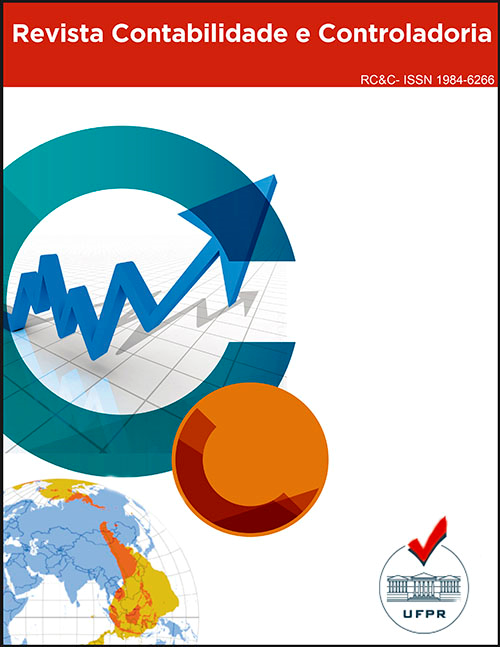Relevance of corporate governance to credit risk analysis in financial institutions
DOI:
https://doi.org/10.5380/rcc.v6i3.35286Palavras-chave:
Governance, Financial Institutions, Credit Analysis.Resumo
The purpose of this study was to analyze whether the adoption of corporate governance (CG) by firms applying for loans is relevant to the process of credit analysis in financial institutions. The investigation consisted of an exploratory, qualitative multiple-case study of three of five Brazil’s largest financial institutions: Banco Itaú, Banco do Brasil e BNDES, with in-depth semi-structured interviews. The study used as analysis categories the CG practices recommended by International Finance Corporation - IFC (CG tools for listed and unlisted firms), Brazilian Institute of Corporate Governance ‒ IBGC, Brazilian Security and Exchange Commission – CVM, Brazilian Stock Exchange - BM&FBovespa (GC rules for Level 1, Level 2 and New Market listing segments). In the point of view of the interviewed, from a list of the 21 CG practices, organized into five groups, 10 practices were considered extremely relevant, 8 very relevant, and 3 few relevant. Among the five subcategories of analysis, the one assigned the highest average rank of relevance was “transparency and disclosure”, followed in decreasing order by “control environment and process”, “treatment of minority shareholders”, “commitment to corporate governance”, and “structure and functioning of the board of directors”. The sampled banks did not have special lines of credit for firms practicing CG, but the adoption of such practices was considered very or extremely relevant in the process of credit risk assessment and favored access to differentiated levels of financing and/or reduced rates. The study contributes to the literature on the association between CG practices, access to financing and financing costs, by testing whether CG practices are deemed relevant to the process of credit risk assessment and whether the adoption of such practices provides access to differentiated levels of credit and/or reduced lending rates in three major Brazilian banks.
Downloads
Como Citar
Edição
Seção
Licença
Copyright (c) 1969 RC&C. Revista de Contabilidade e Controladoria

Este trabalho está licenciado sob uma licença Creative Commons Attribution-NonCommercial-NoDerivatives 4.0 International License.
A Revista Contabilidade & Controladoria, através do Programa de Pós-Graduação em Contabilidade do Departamento de Contabilidade - Setor de Ciências Sociais Aplicadas - Universidade Federal do Paraná, detém todos os direitos autorais.
Os artigos publicados são de responsabilidade dos autores não representando, necessariamente, a opinião da revista. A reprodução dos artigos, total ou parcial, pode ser feita desde que citada a fonte.











